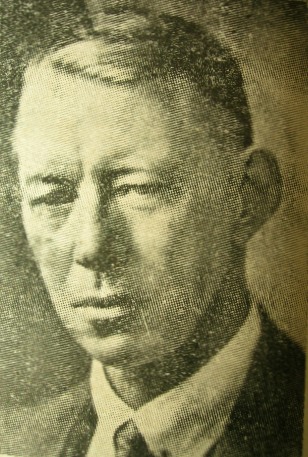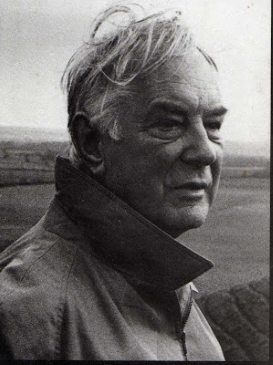Related Research Articles

John Milton was an English poet, polemicist, and civil servant. His 1667 epic poem Paradise Lost, written in blank verse and including twelve books, was written in a time of immense religious flux and political upheaval. It addressed the fall of man, including the temptation of Adam and Eve by the fallen angel Satan and God's expulsion of them from the Garden of Eden. Paradise Lost elevated Milton's reputation as one of history's greatest poets. He also served as a civil servant for the Commonwealth of England under its Council of State and later under Oliver Cromwell.

Thomas Stearns Eliot was a poet, essayist and playwright. He is considered to be one of the 20th century's greatest poets, as well as a central figure in English-language Modernist poetry. His use of language, writing style, and verse structure reinvigorated English poetry. He is also noted for his critical essays, which often re-evaluated long-held cultural beliefs.

William Barnes was an English polymath, writer, poet, philologist, priest, mathematician, engraving artist and inventor. He wrote over 800 poems, some in Dorset dialect, and much other work, including a comprehensive English grammar quoting from more than 70 different languages. A linguistic purist, Barnes strongly advocated against borrowing foreign words into English, and instead supported the use and proliferation of "strong old Anglo-Saxon speech".
Prose is the form of written language that follows the natural flow of speech, a language's ordinary grammatical structures, or typical writing conventions and formatting. Thus, prose includes academic writing and differs most notably from poetry, where the format consists of verse: writing formatted in lines, which traditionally follow rhythmic metre or a rhyme scheme. The word "prose" first appeared in English in the 14th century. It is derived from the Old French prose, which in turn originates in the Latin expression prosa oratio.

Robert Laurence Binyon, CH was an English poet, dramatist and art scholar. Born in Lancaster, England, his parents were Frederick Binyon, a clergyman, and Mary Dockray. He studied at St Paul's School, London and at Trinity College, Oxford, where he won the Newdigate Prize for poetry in 1891. He worked for the British Museum from 1893 until his retirement in 1933. In 1904 he married the historian Cicely Margaret Powell, with whom he had three daughters, including the artist Nicolete Gray.

Sir Edmund William Gosse was an English poet, author and critic. He was strictly brought up in a small Protestant sect, the Plymouth Brethren, but broke away sharply from that faith. His account of his childhood in the book Father and Son has been described as the first psychological biography.
British literature is from the United Kingdom of Great Britain and Northern Ireland, the Isle of Man, and the Channel Islands. This article covers British literature in the English language. Anglo-Saxon literature is included, and there is some discussion of Latin and Anglo-Norman literature, where literature in these languages relate to the early development of the English language and literature. There is also some brief discussion of major figures who wrote in Scots, but the main discussion is in the various Scottish literature articles.

In book publishing, an anthology is a collection of literary works chosen by the compiler; it may be a collection of plays, poems, short stories, songs, or related fiction/non-fiction excerpts by different authors.

Arthur David Waley was an English orientalist and sinologist who achieved both popular and scholarly acclaim for his translations of Chinese and Japanese poetry. Among his honours were appointment as Commander of the Order of the British Empire in 1952, receiving the Queen's Gold Medal for Poetry in 1953, and being invested as a Member of the Order of the Companions of Honour in 1956.

Robert Silliman Hillyer was an American poet and professor of English literature. He won a Pulitzer Prize for poetry in 1934.

Thomas Bainbrigge Fletcher was an English entomologist. Although an amateur lepidopterist who worked in the Royal Navy, he became an expert on "microlepidoptera" and was appointed as the second Imperial Entomologist in India to succeed Harold Maxwell Lefroy. Although only an amateur entomologist, he is credited with reorganizing entomological research in India by coordinating and directing research, efficient sharing of findings and a reduction in duplication of research work.

Geoffrey Edward Harvey Grigson was a British poet, writer, editor, critic, exhibition curator, anthologist and naturalist. In the 1930s he was editor of the influential magazine New Verse, and went on to produce 13 collections of his own poetry, as well as compiling numerous anthologies, among many published works on subjects including art, travel and the countryside. Grigson exhibited in the London International Surrealist Exhibition at New Burlington Galleries in 1936, and in 1946 co-founded the Institute of Contemporary Arts. Grigson's autobiography The Crest on the Silver was published in 1950. At various times he was involved in teaching, journalism and broadcasting. Fiercely combative, he made many literary enemies.

Frank Laurence Lucas was an English classical scholar, literary critic, poet, novelist, playwright, political polemicist, Fellow of King's College, Cambridge, and intelligence officer at Bletchley Park during World War II.
J. M. Cohen was a prolific translator of European literature into English.
William John Courthope, was an English writer and historian of poetry, whose father was rector of South Malling, Sussex.
Nationality words link to articles with information on the nation's poetry or literature.
Nationality words link to articles with information on the nation's poetry or literature.

English literature is literature written in the English language from the English-speaking world. The English language has developed over more than 1,400 years. The earliest forms of English, a set of Anglo-Frisian dialects brought to Great Britain by Anglo-Saxon invaders in the fifth century, are called Old English. Beowulf is the most famous work in Old English. Despite being set in Scandinavia, it has achieved national epic status in England. However, following the Norman conquest of England in 1066, the written form of the Anglo-Saxon language became less common. Under the influence of the new aristocracy, French became the standard language of courts, parliament, and polite society. The English spoken after the Normans came is known as Middle English. This form of English lasted until the 1470s, when the Chancery Standard, a London-based form of English, became widespread. Geoffrey Chaucer (1343–1400), author of The Canterbury Tales, was a significant figure developing the legitimacy of vernacular Middle English at a time when the dominant literary languages in England were still French and Latin. The invention of the printing press by Johannes Gutenberg in 1439 also helped to standardise the language, as did the King James Bible (1611), and the Great Vowel Shift.
John Mitford (1781–1859) was an English clergyman and man of letters.
William Lindsay Renwick was Professor of English Literature at Durham University from 1921 to 1945 and Regius Professor of Rhetoric and English Literature at the University of Edinburgh from 1945 to 1959.
References
- ↑ Office, Great Britain Foreign (1959). The Foreign Office List and Diplomatic and Consular Year Book for 1959. Harrison and Sons – via Google Books.
- ↑ "Haikou (China) - Britannica Online Encyclopedia". Britannica.com. Retrieved 24 November 2012.
- ↑ Gems of Chinese Verse (1919) - full text on archive.org
- ↑ "More gems of Chinese poetry, tr. into English verse by W. J. B. Fletcher, with comparative passages from English literature. - SearchWorks (SULAIR)". Searchworks.stanford.edu. Retrieved 24 November 2012.
- ↑ Scan of the 1919 printing at University of Hong Kong Libraries